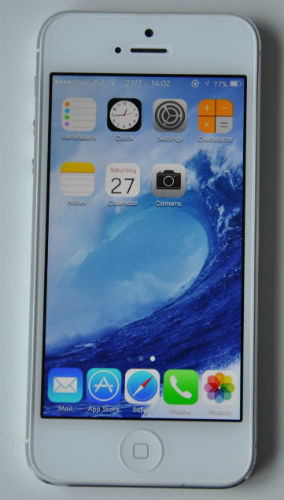iOS and Android are the two most popular mobile ecosystems nowadays. Both have their share of ardent fanboys and detractors.
I have always been a long-time iOS user and the iPhone is usually my mobile phone of choice. Here are some reasons why I prefer iOS to Android.
 Easy to use
Easy to use
Compared to Android, the iPhone and iOS is easy to use. Everything that you want to see, from apps to system functions, is all displayed on the home screen the moment you unlock the phone. You don’t have to navigate through dozens of hidden menus and spend time searching for the right function just to perform a simple task, such as adjusting the brightness or the volume of your iPhone.
Superior App Store
Because of Apple’s strict approval procedure for App Store apps, the apps for iPhone tend to be of a higher quality compared those found on Google’s Play Store (Android). So iOS users can feel secure in the fact that the apps they download will never mess up or install harmful viruses into their phones, due to this approval procedure.
There are also many more apps available on the App Store (900,000), compared to the Google Play Store (800,000). What is more, a lot of the top grossing apps available on the App Store can’t be found on the Google Play Store. Some research by techcrunch.com (May 2013) found that only 32 out of the top 50 applications on the App Store are available for download on the Play Store.
“iOS exclusive” apps
As well, many apps are initially made “exclusive” to the iOS platform when they are first launched. It is only after a long time that the developers will consider launching the same app on other platforms.
A good example of this is the highly popular photo-sharing app, Instagram. It was an iOS exclusive app to begin with. But due to intense public demand, the developers eventually released the app on the Android platform – one year after its launch on iOS.
So this means that iPhone users get first preference of apps and they can get to try the hottest new apps before anyone else can get their hands on it.
Easy syncing with other Apple products
When you have an iPhone, you can easily sync important content, such as valuable photos, videos and documents, to another Apple device, be it an iPad or a Macbook.
So when your iPhone has run out of battery, you need not despair that you have lost the content of that important document that you’ve been working on. You can simply whip out your iPad or boot up your Macbook and continue working where you have left off, due to the automatic syncing of your content onto iCloud, the storage system used for Apple iDevices.
More intuitive predictive text
Compared to Android phones, the iPhone has a better predictive text system. This means that the phone is able to predict more accurately what you are saying as you are typing. So you don’t need to go back and re-type the word because your phone has predicted it wrongly. Android phones have the tendency to guess wrongly about what you are saying, thus wasting precious time having to revert back to the previous word and re-typing it.
Consistent and regular updates
When you buy an iOS device, such as an iPhone, you can be certain that you will receive major updates to the latest software almost as soon as Apple releases them. Moreover, Apple continues to support their iDevices with new updates at least two generations after they are first launched to the public, so this increases the value of an older iOS device.
This regularity is certainly not the case with Android, because of the huge levels of fragmentation between not only the various Android-based phones, but also with phones and tablets.
Moreover, the various hardware companies adopting Google’s Android software will want to check if the latest update is still compatible with their company-installed applications and so on, before finally releasing them to customers. This may take from several months to a year. So if you buy an Android device, you may never get a software update.
Sure, Android fanboys may argue that you will get regular updates from Google if you buy a Nexus or stock Android device, but come to think of it, the overwhelming majority of Android users don’t buy Nexus devices – hence the fragmentation.
Relevant Articles

Leave a Comment